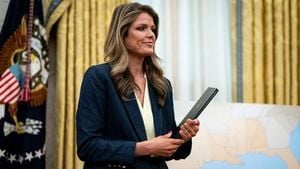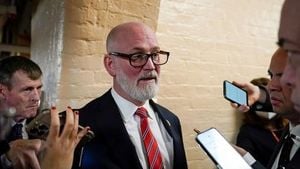In a dramatic escalation of political and diplomatic tensions, Brazil’s Public Prosecutor’s Office has charged Congressman Eduardo Bolsonaro, son of former President Jair Bolsonaro, with coercion for allegedly attempting to influence a high-profile court case against his father. The move, announced on September 23, 2025, comes amid a flurry of U.S. sanctions targeting key figures in Brazil’s judiciary, deepening an already fraught relationship between the two countries.
The charges stem from what prosecutors describe as a concerted effort by Eduardo Bolsonaro and influencer Paulo Figueiredo to pressure Brazilian judicial authorities. According to the Public Prosecutor’s Office, Eduardo Bolsonaro, who has been residing in the United States for several months, threatened officials with the prospect of U.S. sanctions if the court did not deliver a verdict favorable to his father. Jair Bolsonaro, the former president and a polarizing figure in Brazilian politics, was recently sentenced to 27 years in prison for his role in an attempted coup.
Attorney General Paulo Gonet, in a detailed 63-page indictment, laid out the case against Eduardo Bolsonaro and Paulo Figueiredo. "Messrs. Eduardo Bolsonaro and Paulo Figueiredo, freely, consciously, and voluntarily, coordinated successive and continuous actions aimed at interfering in the criminal proceedings and in the case with charges pending review against Paulo Figueiredo himself," Gonet wrote, as cited by AFP. The prosecution alleges that the threats were not only unequivocal but also persistent, with the aim of subjugating the interests of the Republic to the personal objectives of the accused.
The timing of the charges could hardly be more sensitive. Just a day prior, on September 22, 2025, U.S. authorities under President Donald Trump announced sweeping sanctions against Viviane Barci de Moraes, the wife of Supreme Federal Court Justice Alexandre de Moraes, and a São Paulo-based consulting firm owned by her family. The measures, enacted under the Magnitsky Act, freeze Barci’s assets in the United States, suspend her visas, and bar her and her firm from conducting any economic activity involving U.S. citizens or companies.
According to AFP and AP Photo, the sanctions were justified by U.S. officials as a response to what they described as a campaign of political persecution and human rights abuses led by Justice de Moraes. U.S. Treasury Secretary Scott Bessent accused the Brazilian justice of orchestrating censorship, arbitrary arrests, and politicized judicial proceedings. Meanwhile, Secretary of State Marco Rubio went further, alleging that de Moraes had committed "serious human rights abuses."
The U.S. actions did not stop there. President Trump also imposed punitive tariffs of 50% on select Brazilian exports, labeling the penalties as retaliation for what he considered a "witch hunt" against his political ally, Jair Bolsonaro. The Brazilian government, for its part, swiftly condemned both the sanctions and the tariffs as an unacceptable interference in the country's internal affairs. In a statement, they described the measures as an attempt to undermine Brazil’s sovereignty and judicial independence.
Justice Alexandre de Moraes himself responded to the sanctions with a strongly worded statement, declaring, "The illegal and regrettable application of the Magnitsky Act to my wife (...) violates international law, Brazil's sovereignty, and judicial independence." The sentiment was echoed by many in Brazil’s political establishment, who viewed the U.S. actions as a direct affront to the country’s institutions.
Eduardo Bolsonaro, meanwhile, was quick to link his indictment to the U.S. campaign against the Brazilian judiciary. Speaking to reporters, he decried the charges as politically motivated, dismissing them as a "waste of time" and vowing, "we will not be intimidated." His co-defendant, Paulo Figueiredo, faces similar penalties, with the possibility of one to four years in jail if convicted.
The implications of these intertwined legal and diplomatic maneuvers are profound. For one, the charges against Eduardo Bolsonaro and Paulo Figueiredo threaten to further polarize an already deeply divided Brazilian society. Jair Bolsonaro remains a hero to many on the right, who view the legal proceedings against him as a politically motivated attack. On the other hand, his critics argue that the former president’s conviction for attempting a coup is a necessary step to safeguard Brazil’s democracy.
In the United States, the Trump administration’s decision to intervene so forcefully in Brazil’s domestic affairs has raised eyebrows among diplomats and legal scholars alike. The use of the Magnitsky Act—a law originally designed to punish foreign officials implicated in human rights abuses—against the family of a sitting Supreme Federal Court justice is virtually unprecedented. Critics argue that this application of the law stretches its intended purpose and risks setting a dangerous precedent for international relations.
Supporters of Trump’s actions, however, insist that the sanctions are justified by what they see as a pattern of judicial overreach and political persecution in Brazil. They point to the arrest and prosecution of Jair Bolsonaro as evidence that the country’s judiciary has become politicized, and argue that international pressure is necessary to restore fairness and transparency.
Back in Brazil, the government’s response has been defiant. Officials have characterized the U.S. measures as an attempt to "subjugate the interests of the Republic and the entire community to [the] personal designs" of foreign actors, as described in Attorney General Gonet’s indictment. The government has also warned that further sanctions against Brazilian magistrates and officials could be forthcoming, citing confidential sources reported by AFP.
As the standoff continues, ordinary Brazilians are left to grapple with the fallout. The punitive tariffs imposed by the Trump administration threaten to disrupt key sectors of Brazil’s export economy, raising concerns about jobs and growth. Meanwhile, the legal drama surrounding the Bolsonaro family shows no sign of abating, with new revelations and accusations surfacing almost daily.
For observers both inside and outside Brazil, the situation offers a vivid illustration of how legal battles can spill over into the realm of international diplomacy, with consequences that extend far beyond the courtroom. As the story unfolds, all eyes will remain fixed on Brasília and Washington, where the next moves could reshape the political landscape for years to come.




